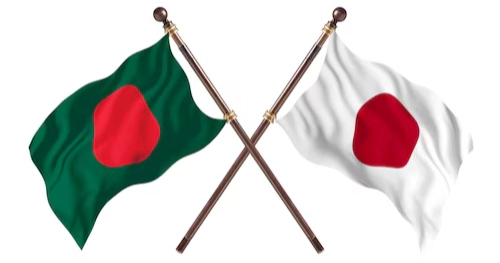Bangladesh and Japan have mapped out an ambitious roadmap for bilateral cooperation during the 6th Japan-Bangladesh Foreign Office Consultations held in Tokyo on Thursday. The high-level talks, which come ahead of Chief Adviser Professor Muhammad Yunus’ scheduled visit to Japan later this month, focused on elevating the strategic partnership between the two nations across multiple sectors.
At the consultations led by Bangladesh’s Foreign Secretary (East) Dr Md Nazrul Islam and Japan’s Senior Deputy Foreign Minister Akahori Takeshi, both sides reaffirmed their commitment to deepening cooperation under Japan’s Free and Open Indo-Pacific (FOIP) vision and the Bay of Bengal Industrial Growth Belt (BIG-B) initiative.
Japanese officials emphasised their intention to support high-quality infrastructure development in Bangladesh while encouraging Japanese manufacturers to expand their industrial value chains into the country.
The timing of these discussions coincides with Professor Yunus’ upcoming visit to Tokyo, where he will participate in Nikkei’s 30th Future of Asia conference on May 29-30.
Diplomatic sources indicate that arrangements are being made for the Nobel laureate to hold a bilateral meeting with Japanese Prime Minister Shigeru Ishiba during his visit. Professor Yunus, who received the Nikkei Asia Prize in 2004, is expected to discuss avenues for strengthening Bangladesh-Japan economic and development cooperation.
Economic collaboration formed a central pillar of the discussions, with Japan taking positive note of Bangladesh’s request for continued Duty-Free Quota-Free market access for Bangladeshi products after the country’s graduation from Least Developed Country status.
The Japanese side expressed willingness to work toward improved market access for Bangladeshi agricultural products, particularly fruits and vegetables. Bangladesh also sought Japan’s support for increased Official Development Assistance loans with extended repayment periods and additional budgetary support.
On the technical cooperation front, the two nations explored potential collaboration in several critical areas. These included implementing a Joint Crediting Mechanism for energy transition, addressing climate change challenges, enhancing disaster and earthquake management capabilities, and developing industrial waste management infrastructure through Effluent Treatment Plants and Treatment Storage and Disposal Facilities.
Additional discussions covered agricultural mechanisation, shipyard modernisation, and solar power plant development.
Regional stability and humanitarian issues featured prominently in the talks, with Japan commending Bangladesh’s continued hosting of Rohingya refugees. The Japanese delegation reaffirmed their commitment to supporting the safe and voluntary repatriation of forcibly displaced Myanmar Nationals while continuing humanitarian assistance in the camps.
Both sides also exchanged views on broader regional security dynamics and global governance challenges, pledging to strengthen coordination on multilateral issues of mutual interest.
The Japanese government reiterated its strong support for Bangladesh’s interim administration and its reform agenda, emphasising the importance of the strategic partnership between the two countries.
The consultations concluded with both sides expressing satisfaction with the progress made since their last meeting in Dhaka in June 2024 and a shared commitment to fully leverage their respective resources, strategic locations, and technical competencies for mutual benefit.
Foreign Secretary Md Nazrul Islam extended his gratitude to the Japanese government for their warm hospitality during the consultations, which were described by participants as “productive, fruitful, and wide-ranging.”
The outcomes of these talks are expected to lay the groundwork for substantive outcomes during Professor Yunus’ upcoming visit and set the direction for bilateral relations in the coming years.


